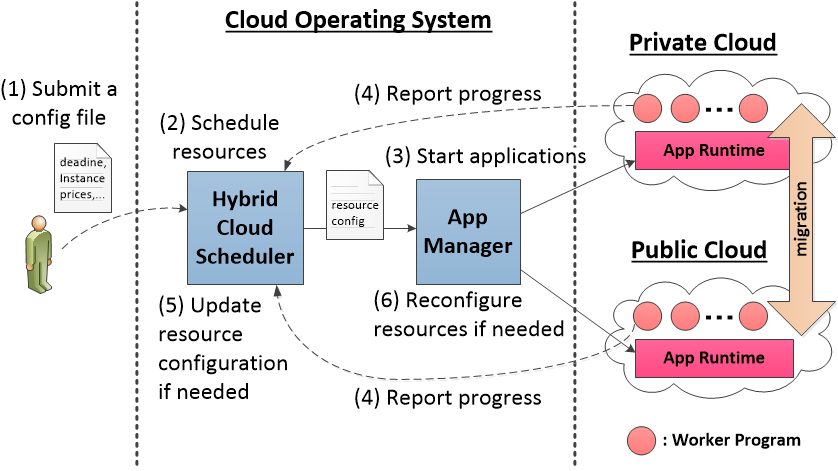
About
The Cloud Operating System (COS) is a middleware framework that supports autonomous workload scalability based on application-level migration as a reconfiguration strategy. Utilizing an actor-model based runtime on multiple IaaS clouds, COS provides seamless scalability over hybrid clouds.
To finish application tasks within a given time period, COS implements a dynamic programming-based scheduling algorithm. Currently, COS is optimized for massively-parallel computationally intensive applications.
How it works

COS generates and maintains a resource configuration (i.e., how many & what Virtual Machine (VM) instances to allocate) to finish all the application tasks before a deadline specified by the user. When scaling up/down VM instances, COS migrates worker programs between the instances so that workloads are balanced.
Open Source Software
COS is an open source software and freely available at Github.Related Publications
- Shigeru Imai, Thomas Chestna, and Carlos A. Varela. Accurate Resource Prediction for Hybrid IaaS Clouds Using Workload-Tailored Elastic Compute Units. In 6th IEEE/ACM International Conference on Utility and Cloud Computing (UCC 2013), Dresden, Germany, December 2013 (PDF).
- Shigeru Imai, Thomas Chestna, and Carlos A. Varela. Elastic Scalable Cloud Computing Using Application-Level Migration. In 5th IEEE/ACM International Conference on Utility and Cloud Computing (UCC 2012), Chicago, Illinois, USA, November 2012 (PDF).
- Qingling Wang and Carlos A. Varela. Impact of Cloud Computing Virtualization Strategies on Workloads' Performance. In 4th IEEE/ACM International Conference on Utility and Cloud Computing (UCC 2011), Melbourne, Australia, December 2011 (PDF).
- Ping Wang, Wei Huang, and Carlos A. Varela. Impact of Virtual Machine Granularity on Cloud Computing Workloads Performance. In Workshop on Autonomic Computational Science (ACS'2010), Brussels, Belgium, pages 393-400, October 2010 (PDF).